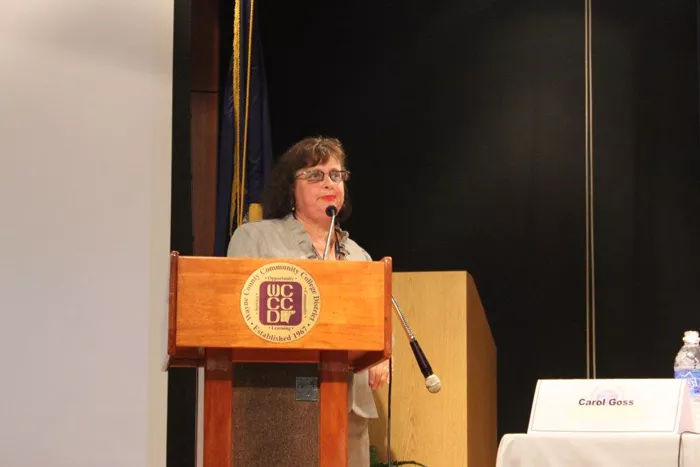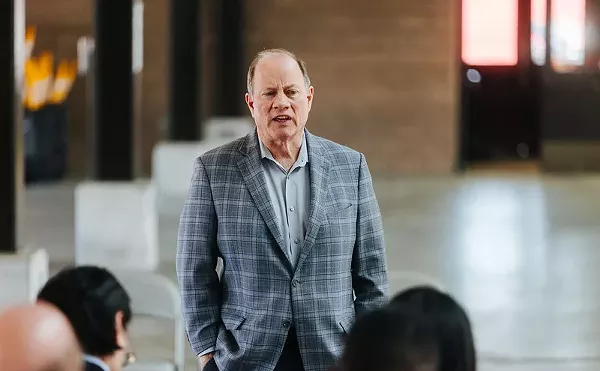
Audio By Carbonatix
[
{
"name": "GPT - Leaderboard - Inline - Content",
"component": "35519556",
"insertPoint": "5th",
"startingPoint": "3",
"requiredCountToDisplay": "3",
"maxInsertions": 100,
"adList": [
{
"adPreset": "LeaderboardInline"
}
]
}
]

It’s an experience many of us have had: We’re driving in winter and hit an icy patch of road. As that stomach-dropping feeling of sliding out of control hits, time, for an instant, lapses into slow motion, and the whole scene turns slightly surreal.
Something akin to that occurred during last week’s meeting of the board overseeing Michigan’s Education Achievement Authority. An experiment being carried out on the students enrolled at 15 low-performing schools (three of which are operated by charters) that were formally part of the Detroit Public Schools system, the EAA is Gov. Rick Snyder’s attempt to re-invent public education.
“A different system, for a different outcome” is the district’s motto.
Begun amid a swirl of controversy and bold promises, the EAA has been hitting patches of serious ice since it began operating schools in the fall of 2012. Long-held concerns by some that the district was veering out of control hit a new level last week, when Chancellor John Covington unexpectedly resigned with one year remaining on his $1.6 million contract. When someone relinquishes hundreds of thousands of dollars in order to attend to family issues and pursue a career in consultancy, which has been Covington’s explanation for quitting, there is usually much more to the story. And rarely is it good.
Although he didn’t leave to become a consultant, Covington’s departure from his previous job as superintendent of Kansas City Public Schools — after assuring the board there that he wasn’t interviewing anywhere else — is instructive. Two week’s after Covington’s arrival in Detroit, the KC schools were taken over by the state of Missouri because of their exceedingly low performance.
There’s going to be no such announcement following his exit from Detroit, of course, since the EAA is already under direct state control. In fact, Covington was supposed to be the fix, the guy to show how things can be done when given both a blank slate in terms of approach, and the complete absence of any responsibility to a democratically elected board of public education.
The 11-member board Covington answers to — or at least was supposed to answer to when still employed by the district — is dominated by gubernatorial appointees. Snyder directly selects seven members, and DPS — which is under state control — appoints two. The other two are appointed by officials at Eastern Michigan University, which continued to partner in the project despite protests from faculty and students unhappy with the course the EAA has taken.
When it comes to the EAA, the bad news just keeps piling up.
Media turns up heat
For a while now, the website Eclectablog has been out in front of all other media, offering a string of reports from (mostly) anonymous EAA teachers describing a host of alleged problems within the district, from physical abuse of students to technology problems to issues regarding special-education students not getting the services due them. Those accusations and more were put on the official record during a hearing on the EAA held in April at the state Capitol by Senate Democrats.
More recently, the Detroit News caused a considerable stir last month when it reported about the high credit card tabs Covington and crew were racking up — to the tune of $178,000 — flying around the country to attend academic conferences. And Bridge Magazine, a respected online publication produced by the nonprofit Center for Michigan, has just posted a story detailing how record-keeping snafus are preventing some students from getting the transcripts needed for college, among other problems. The headline for that story — “F is for frustrated — disorganization at Detroit EAA schools leaves students scrambling to graduate” — says a lot, but not enough to generate any public questions from board members.
Part of what made last week’s board meeting so strange was the lack of any substantive dialogue regarding Covington’s departure — which, by any standard, was a red-flag-generating event.
Equally disconcerting for those who like to see government work in an open manner was the way in which Covington’s temporary (at least for the moment) replacement was selected. With no public discussion whatsoever about how the decision-making process worked, the board emerged from a closed session to announce that Veronica Conforme had been hired as interim chancellor while a nationwide search is launched to find a permanent replacement for Covington. Conforme has been working with the district as a consultant for the past six months. She previously served as chief operating officer of New York City’s public schools, and had been a finalist for the superintendent’s job in New Orleans. In fact, the New Orleans Times-Picayune reported on its website that Conforme had taken her name out of the running for that job while the EAA board was still meeting behind closed doors.
Fire and ice
Adding to all the bizarreness was activist Helen Moore, a high-profile critic of both the EAA and the state’s takeover of Detroit’s public schools. At one point, Moore sat in the audience, holding an iPad in front of her face with the screen showing a picture of Covington, smiling like he’d just hooked another sucker into playing a game of three-card Monte.
An equally weird moment occurred when a handful of the 100 teachers whose contracts aren’t being renewed were permitted five minutes each to appeal their layoffs to the board in open session. (Others decided to make their appeals in closed session.) The layoffs are necessary because student enrollment at EAA schools has plummeted, from about 11,000 when the doors opened in the fall of 2012 to a projected 7,200 for next year.
Aside from the spectacle of teachers struggling to retain their composure while on the hot seat fighting to keep their jobs, there were the comments from Gregory Galperin, a teacher at Henry Ford High School. Galperin caused eyebrows to rise among board members when he talked about the high turnover rate at Ford.
“We had teachers walk away halfway through the school year this year,” he said. “When you see that, it throws up a red flag.”
Curt Guyette is an investigative reporter for the ACLU of Michigan. His work, which focuses on Michigan’s emergency management law and open government, is funded by a grant from the Ford Foundation. You can find more of his reporting at aclumich.org/democracywatch. Contact him at 313-578-6834 or cguyette@aclumich.org.





